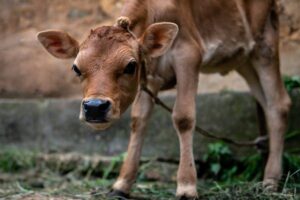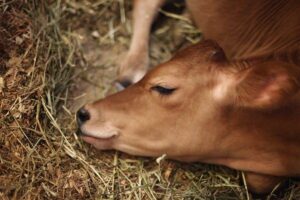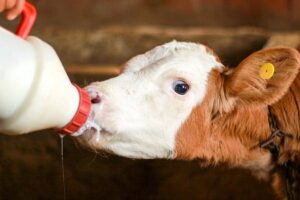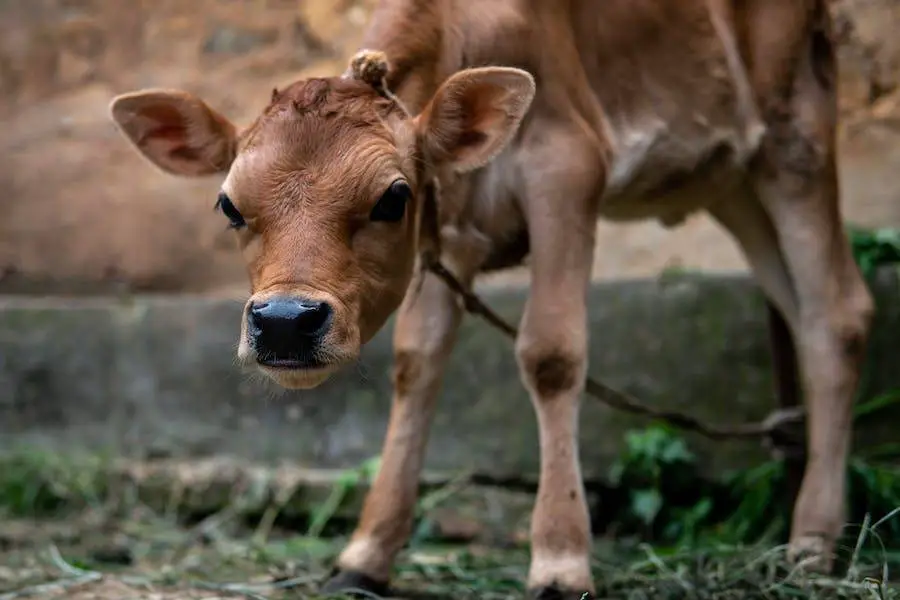Table of Contents
A newborn calf’s first few days are critical for its health and survival. As a responsible caretaker, it’s essential to monitor their feeding habits closely.

If your five-day-old calf is not eating or drinking, it can be a cause for concern.
This comprehensive guide will provide insights into the potential causes, evaluation techniques, and steps you can take to ensure your calf’s health.
Common Reasons Why 5-Day-Old Calve May Stop Eating or Drinking
Illness or Disease
Various illnesses such as pneumonia, scours (diarrhea), or infections can cause a calf to lose its appetite. These diseases often come with other symptoms like lethargy, fever, coughing, or abnormal feces.
Solution: Veterinary Intervention and Proper Care
If your calf shows signs of illness, it’s crucial to contact a vet immediately.
They can diagnose the condition and prescribe appropriate treatment, which may include medication, dietary changes, or supportive care.
In addition to professional medical treatment, ensure that the calf is comfortably housed, with easy access to clean water and nutritious food.
Regular monitoring of the calf’s condition is also essential to assess its recovery and adjust the treatment plan as necessary.
Poor Quality Feed
If the milk or feed provided is of poor quality or has a bad taste, the calf may refuse to eat or drink. This can also lead to nutritional deficiencies.
Solution: High-Quality Feed and Proper Feeding Practices
Ensure you’re providing high-quality, fresh feed and clean water. If you’re using a milk replacer, follow the instructions carefully to ensure it’s mixed correctly.
The feed should be stored properly to avoid spoilage and contamination. Additionally, observe the calf’s feeding behavior to ensure it’s eating adequately and at regular intervals.
If the calf continues to refuse the feed, consider seeking advice from a vet or a livestock nutritionist.
Stress
Stressful conditions such as weaning, transportation, sudden weather changes, or overcrowding can lead to loss of appetite in calves.
Stress can also weaken their immune system, making them more susceptible to diseases.
Solution: Stress Management and Animal Welfare Practices
Minimize stress by providing a stable environment, proper shelter, and gentle handling. Gradual weaning can also help reduce stress.
Consider implementing low-stress handling techniques, such as moving slowly around the calf, avoiding loud noises, and using gentle physical contact.
Providing adequate space for the calf to move around can also help reduce stress and improve its overall well-being.
Dehydration

Dehydration can cause a decrease in appetite and thirst in calves. This could be due to diarrhea, heat stress, or inadequate water supply.
Solution: Hydration Management and Monitoring
Always provide access to fresh, clean water. If the calf is dehydrated, consider using oral rehydration solutions to replace lost fluids and electrolytes.
Monitor the calf’s hydration status by checking for signs of dehydration, such as dry mouth, sunken eyes, or skin tenting.
If the calf continues to show signs of dehydration despite your efforts, seek veterinary advice immediately.
Parasites
Internal parasites can cause discomfort and disease, leading to a decrease in appetite. They can also cause weight loss and poor growth.
Solution: Parasite Control and Good Sanitation Practices
Regular deworming, under the guidance of a vet, can help control parasite infestations.
Good sanitation practices, such as regular cleaning of the calf’s housing area and proper disposal of feces, can prevent the spread of parasites.
Additionally, avoid overcrowding and ensure that the calf has a balanced diet to support its immune system.
Dental Problems
Oral injuries or dental issues can make eating and drinking painful for the calf, causing it to avoid food and water.
Solution: Regular Oral Health Checks and Veterinary Care
Regularly check the calf’s mouth for any signs of injury, inflammation, or abnormal growth. If you notice any issues, contact a vet for a thorough oral examination and treatment.
In the case of dental problems, the vet may need to perform procedures like tooth extraction or filing. Providing soft, easy-to-chew feed can also help alleviate discomfort during eating.
Change in Environment
A sudden change in environment, such as moving the calf to a new pen or introducing new animals into its space, can cause stress and disrupt eating patterns.
Solution: Gradual Environmental Changes and Habituation
To minimize the impact of environmental changes, try to introduce new elements gradually whenever possible.
For example, if you’re moving the calf to a new pen, let it explore the new area under supervision for a few hours each day before making the move permanent.
If you’re introducing new animals, do so one at a time and monitor their interactions to ensure they are getting along.
Providing familiar items, like favorite toys or bedding, can also help the calf adjust to new environments.
Nutritional Deficiencies
Lack of certain nutrients, such as vitamins and minerals, can affect a calf’s appetite and overall health. This could be due to poor quality feed or inadequate feeding practices.
Solution: Balanced Diet and Regular Nutritional Assessment
Ensure that the calf’s diet is balanced and meets its nutritional needs. This may involve using supplements or fortified feeds, particularly for calves that are being bottle-fed or weaned.
Regularly assess the calf’s nutritional status, either through visual examination (checking for signs like poor coat condition or slow growth) or more formal methods like blood tests.
Consult with a vet or a livestock nutritionist to determine the best diet for your calf.
Evaluating Your Calf’s Condition

Regularly checking your calf’s body condition, temperature, heart rate, and respiratory rate can provide valuable information about its health status.
Also, observe for any signs of dehydration, such as dry mouth, sunken eyes, or skin tenting.
Keep a close eye on the calf’s feeding habits. If it is not nursing from its mother or not interested in milk replacer, it may be a sign of an underlying problem.
When to Call a Vet
If your calf continues to refuse food or water despite your efforts, or if it exhibits other concerning symptoms like weakness, diarrhea, or persistent crying, it’s time to call a vet.
The vet will likely perform a thorough physical examination, ask about the calf’s history and environment, and may perform additional tests such as blood tests or fecal analysis to diagnose the problem.
Home Care Techniques for Encouraging Eating and Drinking
Try different strategies to stimulate the calf’s appetite, such as offering high-quality calf starter, providing fresh water at all times, and ensuring a calm and comfortable environment.
If the calf is dehydrated, oral rehydration solutions can help replace lost electrolytes and stimulate the calf’s thirst reflex, encouraging it to drink.
Prevention Strategies
Regular health checks can detect early signs of illness and prevent them from escalating into serious problems. This includes monitoring the calf’s behavior, appetite, and physical condition.
Providing a balanced diet, clean water, and a stress-free environment can go a long way in preventing health issues in calves.
Conclusion
Caring for a newborn calf can be challenging, but understanding their needs and behaviors can help ensure they grow into healthy adults.
If your calf is not eating or drinking, it’s important to act quickly. With the right knowledge and resources, you can tackle this issue effectively and ensure your calf’s well-being.

